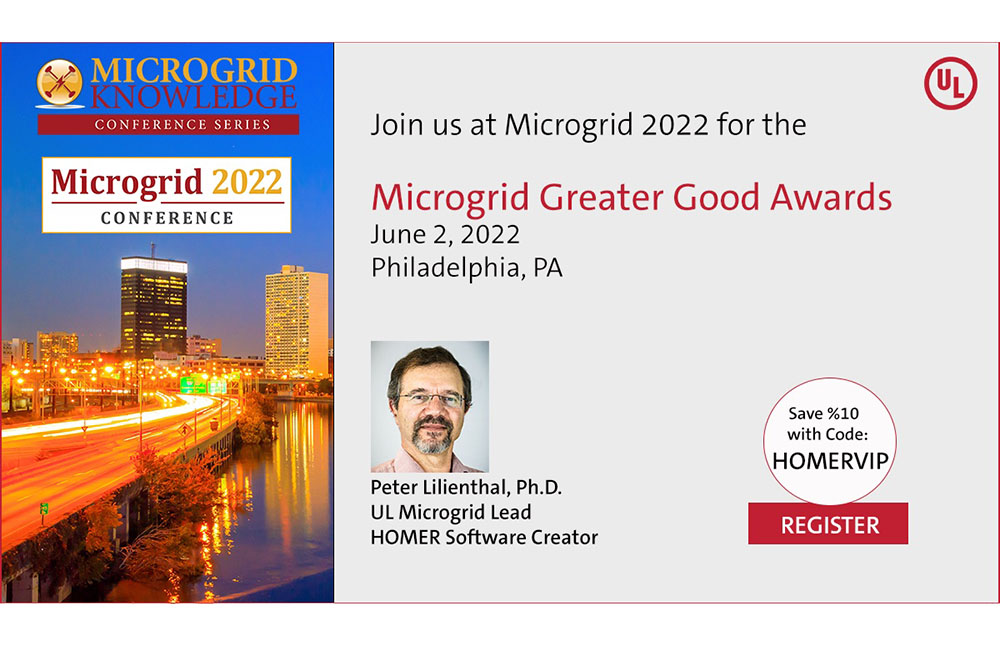Eight finalists are in the running for top awards in the 2022 Microgrid Greater Good competition, a highlight of the annual Microgrid Knowledge conference taking place June 1-2 in Philadelphia. The four winners will be announced at Microgrid 2022: Microgrids as Climate Heroes.
The Microgrid Greater Good Awards — which conference organizer and news site Microgrid Knowledge produces annually — celebrate “microgrids that fulfill a clear societal need and show how microgrids improve the human condition.” Drawn from worldwide nominations, award nominees showcase innovative microgrid design and execution, and the power of microgrids to transform communities and deliver electricity to remote areas.

“Not all technologies do good for the world, and sometimes those that do have trouble telling their story. Microgrids, by their nature, make the telling easy,” said Elisa Wood, Microgrid Knowledge editor-in-chief. “They can be found worldwide, providing a range of humanitarian benefits, from creating electricity for medical care at refugee camps in Africa to helping U.S. states like Louisiana recover from devastating hurricanes.”
Peter Lilienthal, Ph.D., UL Renewables global microgrid lead and HOMER software creator, will present this year’s awards. Lilienthal, who has his doctorate in management science and engineering, has been working to advance microgrids for more than 30 years, including as a senior economist with the National Renewable Energy Laboratory (NREL), where he helped create the NREL’s International and Village Power programs.
“We feel especially fortunate that Dr. Lilienthal has agreed to present the awards this year at Microgrid 2022. Peter is well known and widely respected as a leader who has helped shape the rise of microgrids,” said Wood.
Lilienthal noted that microgrids today provide energy resilience, cost-cutting, renewable energy integration and grid stabilization.
Seeing a remote community in a developing country flourish with the arrival of electricity is thrilling,” said Lilienthal. “The Microgrid Greater Good Awards are a celebration of the transformative power of clean energy and the enormous diversity of microgrid approaches.”
Chosen from a field of more than sixty nominations, top contenders for this year’s awards include two finalists for the Microgrid Greater Good Award Highest Recognition. One is the Footprint Project, enabled by Schneider Electric through a partnership with Microsoft. Schneider created the Footprint Project in 2021 to deliver mobile microgrids for disaster relief to New Orleans in the wake of Hurricane Ida.
The second contender in this category is a project in northeastern India that developed a solar-plus-storage microgrid on Kudagaon Island in the Mahanadi River. The electrical power has transformed life in the community by delivering extra hours of light that enable children to study; it frees the community from fear of poisonous snakes in the streets after dark and supports new business opportunities.
The top two nominees in the grid-connected category include two college campus microgrids — one in Santa Rosa, California, and the other in Melbourne, Australia. Both areas recently experienced the severe impacts of wildfires, making resilience a top priority. The microgrids will also provide the campuses with electricity cost-cutting, electric vehicle charging, carbon reduction and energy education.
Finalists in the remote microgrid category include the Alaskan native community of Shungnack in northwest Alaska and a health center microgrid in the Ladakh region of India.
“Every year when the full list of nominations crosses my desk — there were 60 this year — I realize how lucky I am to have the job that I have,” said Wood.
To learn more about the top nominees, please visit Microgrid Knowledge.
Join us at Microgrid 2022: Microgrids as Climate Heroes
Save 10% on your registration when you use code HOMERVIP.
Don’t miss our special HOMER Technology Workshop. We’ll present Destination Hybrid Success: Optimizing Microgrids to Deliver Resilience and EV Charging, while Cutting Costs and Emissions on June 2, 2:45-3:45 p.m. EDT.

UL Solutions HOMER Grid is a market-leading solar-plus-storage software tool for designing grid-tied distributed energy systems. With an integrated utility tariff database and a new module for electric vehicle charging stations, it optimizes peak shaving to help commercial and industrial utility customers lower their demand charges. HOMER Grid can model projects with wind and combined heat and power as well as islanded systems, helping users improve their resiliency. Explore your opportunities with HOMER Grid during a complimentary trial. Learn more and download your complimentary trial.
